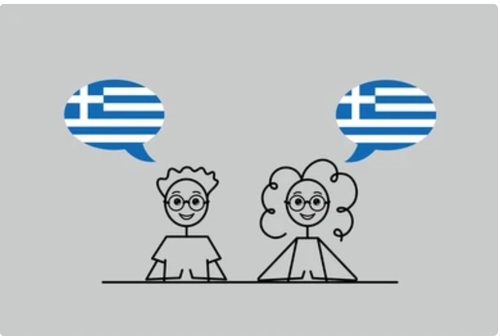RESOURCES

DIY Learn a Language - Greek
DIY Learn a Language - GreekStories in Greek
Little Red Riding Hood
The Very Hungry Caterpillar
The Enormous Turnip
The Three Little Pigs - Building a House from Straw
Grammar
Ten most common verbs conjugated in the present simple tense
We've been visiting Greece for a couple of years' summer holidays, and as a keen language learner, I decided I'd try and learn Greek. I bought a book, I found some online resources and made a start.
I found it a bit of a struggle. I have to admit that as a language teacher, I was impatient with following someone else's methodology. The book I bought was very thorough but extremely dull. It had all the grammar in it, but wasn't stimulating at all.
I had a little more success with the audio files I listened to following a very well-known method, but this disappointed me in terms of not having much if any focus on the alphabet. I love to listen, but I also want to be able to read what I'm trying to learn.
So, to cut a long story short, I decided I would do it myself, hence the title DIY Learn a Language - Greek.
What does this mean - DIY Learn a Language?
In my school, we teach English by getting the children to do things. There is some explanation of how language works, but by and large the children do really interesting stuff in English, all very well organized, very structured and cyclical, but based around the children's age, needs, interests. So, I decided I'd try to build myself my own lessons using this philosophy.
What does learning by doing mean?
I learned Russian during a stay in a school where I had to learn a passage from a short story, a piece of news, a dialogue every day. The teacher never actually said 'learn it by heart'. But, she would ask questions about the text that meant that the only way you could guarantee being able to respond was if you had learned the text. She wouldn't allow us to rote speak the text. She would ask us questions around the text. This made us search through the memory we had of the text, think about which part of it 'fits' the answer she was looking for and then attempt to express the answer. I know now that this was very effective. Learning by doing with very young children exposes the children to chunks of language in a similar way but without them having to learn anything by heart. It just happens naturally as they repeat so much language through painting, crafting, doing science, building something etc.
So, my plan was to find 'chunks' of language I am familiar with or could easily familiarise myself with. Next I'd create this text in Greek. Then, I'd create audio of it and as I walk my dog every day I'd listen, look, read, repeat.
At the same time, when I had time, I'd create interactive materials for myself - think sequencing phrases, images and texts for the life cycle of a butterfly which I'd print out, cut up, and then read and try and sort. Mostly, though, it turned out that I'd listen, read every day while dog walking.
Some things I did to get started:
1) I installed Greek keyboard layout on my laptop and forced myself to type much of the texts I'm listening to.
2) I installed an app. called All Language Translator on my phone which I use to speak into to check a) my pronunciation, and b) anything I'm not sure about.
![/userfiles/files/all%20language%20translate%20very%20hungry%20caterpillar.jpg [/userfiles/files/all%20language%20translate%20very%20hungry%20caterpillar.jpg]](/userfiles/files/all%20language%20translate%20very%20hungry%20caterpillar.jpg)
NB - I bought the ad-free version, the pop up ads were annoying. Plus, if it's noisy around the voice translation doesn't pick up so well.
3) I use a Chatbot in Edge (now called Copilot) to generate texts (stories, science processes) in English first, which I then edit so that the text shows plenty of repetition of phrases.
4) I use the same bot to translate the text into Greek.
5) I place the two languages side by side in a table in Word and screenshot this in chunks so I can archive the images on my phone.
6) I use a site called text to speech free (https://ttsfree.com/) into which I paste the chunks of Greek text to generate an audio file for each chunk. This site allows you to slow the speech down, which I do to between 40 to 50% slower than natural speed.
7) Then I download each audio file which I save and carry around on my phone with the image of the text.
8) A believer in 'if you want to learn something, teach someone else', I created a YouTube channel called 'Learn a language - DIY Greek' to help me consolidate what I am learning. Talking through what I am doing helps me remember and learn.
NB - there are mistakes in the AI generated texts, am sure of it. I'm not worried about that, AI generated language will show pretty accurate grammatical structures, and the most likely problem areas will be inappropriate lexis. When this happens/happened, there are ways of checking.
I should say from the beginning, I got to grips with the alphabet before dealing with any stories, or processes. I recommend sticking with that early familiarisation of the alphabet, it means you can process text input which, for all my preference for audio, it's essential. Now I know the alphabet, I'm beginning to return to the audio-only lessons I felt disappointed with in the beginning. Also, I now go looking for grammar in the comprehensive coursebook I cast aside, but my methodology is listening and reading stories and processes with lots of repetition.